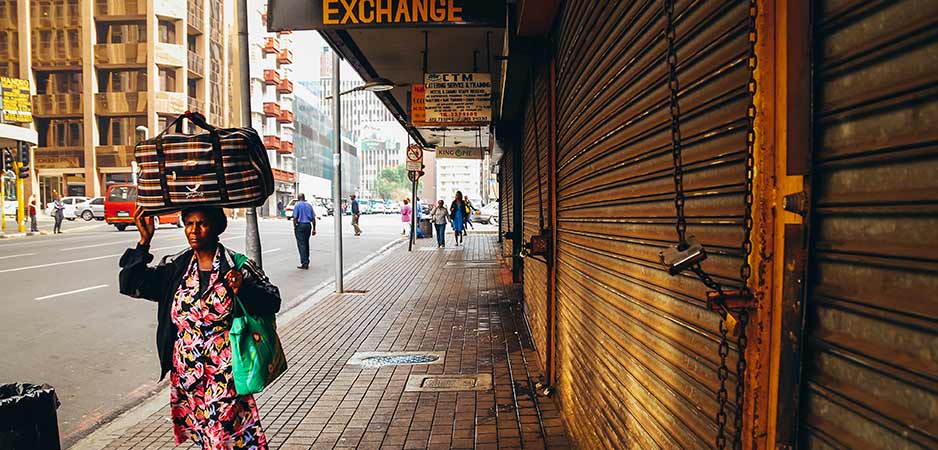Despite having a technocratic president in Cyril Ramaphosa, are the structural underpinnings of the economy so weak that South Africa’s future is endangered? Allied to weak economic foundations are the questions of corruption and extremely poor public administration. The mismanagement at both the Electricity Supply Commission and South African Airways have raised eyebrows around the world. The constant lack of electricity not only means huge power outages for homes, but also constitutes a disincentive for industrial investors.
There is a huge concentration of population in the country’s urban areas, but 29.1% of the working age population are unemployed, although some calculations put the number at 38.5%. Many of these join the resistance against immigrants who are seen as taking what jobs there are. They basically form an urban underclass of growing volatility and, of course, are drawn toward the deliberately inflammatory and mobilizing rhetoric of the likes of Julius Malema.
And, in fact, now that the Democratic Alliance (DA) has imploded, with its key black leaders like Mmusi Maimane having resigned from the party, Malema’s Economic Freedom Fighters (EFF) form the only real parliamentary and populist opposition to Ramaphosa’s African National Congress (ANC) government.
There is a tiny but extremely wealthy elite who are seen by ANC members and non-ANC members alike as commandeering all levers of wealth. Ramaphosa is himself among these. But he presides over a system of elite accumulation that is viewed widely as corrupt or, at best, non-transparent. Transparency International listed South Africa 43 out of 100 in its 2018 Corruption Perceptions Index.
But if Ramaphosa is no longer able to be seen as a man of the people, can he at least lay down plans for economic change? The answer is probably no. Not only is far too large a segment of the population both non-productive and dependent, but the issue of national debt is beginning to loom large over the country. Official figures from 2018 suggest that debt accounts for some 55.8% of GNP, but even South Africa’s own projections suggest it will reach 70% by 2022 and 80% within 10 years.
All this is amidst an economy that grew by 3.1% in the quarter ending June 2019, but in the face of inflation at 4.5% the overall prognosis is of an economy without sufficient capacity to service growing debt, deliver increasing benefits, reestablish working infrastructure, like electricity, and offer a results-led alternative to Malema’s populist demands and simplistic remedies for the future.
The rise of crime requires now only the addition of quality armaments to criminal gangs before a form of urban warfare is foreseeable. Corrupt entry into military arsenals could facilitate that. Only it won’t be gang-on-gang warfare as in the past. The era of insurrection may be looming in South Africa as national unrest contemplates militarization.
What this means is that government fears of an Arab Spring scenario, involving protesting students, as in the “Fees Must Fall” campaign, is misplaced. The students have not joined the EFF in any great numbers and have failed to form alliances outside the universities. What the government is perhaps underestimating is militancy that becomes militarized.
Is this a doomsday scenario? Hopefully it really will be just a scenario that never becomes reality. But the economic conditions of South Africa allow for such doomsday scenarios. At this time, there are no plausible scenarios that are positive and which betoken a planned and financed brighter future. There is only so much a technocratic president can do to steer South Africa toward the dream of an equal rainbow nation in which all had a share. It is a nation facing a looming storm cloud.
The views expressed in this article are the author’s own and do not necessarily reflect Fair Observer’s editorial policy.
Support Fair Observer
We rely on your support for our independence, diversity and quality.
For more than 10 years, Fair Observer has been free, fair and independent. No billionaire owns us, no advertisers control us. We are a reader-supported nonprofit. Unlike many other publications, we keep our content free for readers regardless of where they live or whether they can afford to pay. We have no paywalls and no ads.
In the post-truth era of fake news, echo chambers and filter bubbles, we publish a plurality of perspectives from around the world. Anyone can publish with us, but everyone goes through a rigorous editorial process. So, you get fact-checked, well-reasoned content instead of noise.
We publish 2,500+ voices from 90+ countries. We also conduct education and training programs
on subjects ranging from digital media and journalism to writing and critical thinking. This
doesn’t come cheap. Servers, editors, trainers and web developers cost
money.
Please consider supporting us on a regular basis as a recurring donor or a
sustaining member.
Will you support FO’s journalism?
We rely on your support for our independence, diversity and quality.






